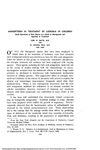Effect of Aminopterin on Epithelial Tissues
June 1983
in “
Archives of Dermatology
”

TLDR Aminopterin effectively improves skin conditions but has toxic side effects that need careful monitoring.
In a 1951 study, "aminopterin," a folic acid antagonist, was administered to 21 patients with psoriasis and other chronic dermatologic disorders to observe its effects on epithelial tissues. The drug, given in daily doses of 1.5 to 2.0 mg, led to significant improvements in psoriatic lesions, with cessation of scaling typically between the 5th and 10th day of treatment. Patients with psoriatic arthritis showed a more complete response than those with uncomplicated psoriasis. However, toxic side effects such as ulceration of mucosa and abdominal cramps were common, often necessitating the discontinuation of treatment. Despite the toxicity, "aminopterin" was found to have a potent suppressive effect on epithelial structures, and it induced remissions in cutaneous lesions that lasted from two weeks to several months. The study concluded that "aminopterin" has a striking inhibitory effect on epithelial derivatives and may be useful in treating dermatologic disorders, although it requires careful supervision due to its toxicity.



